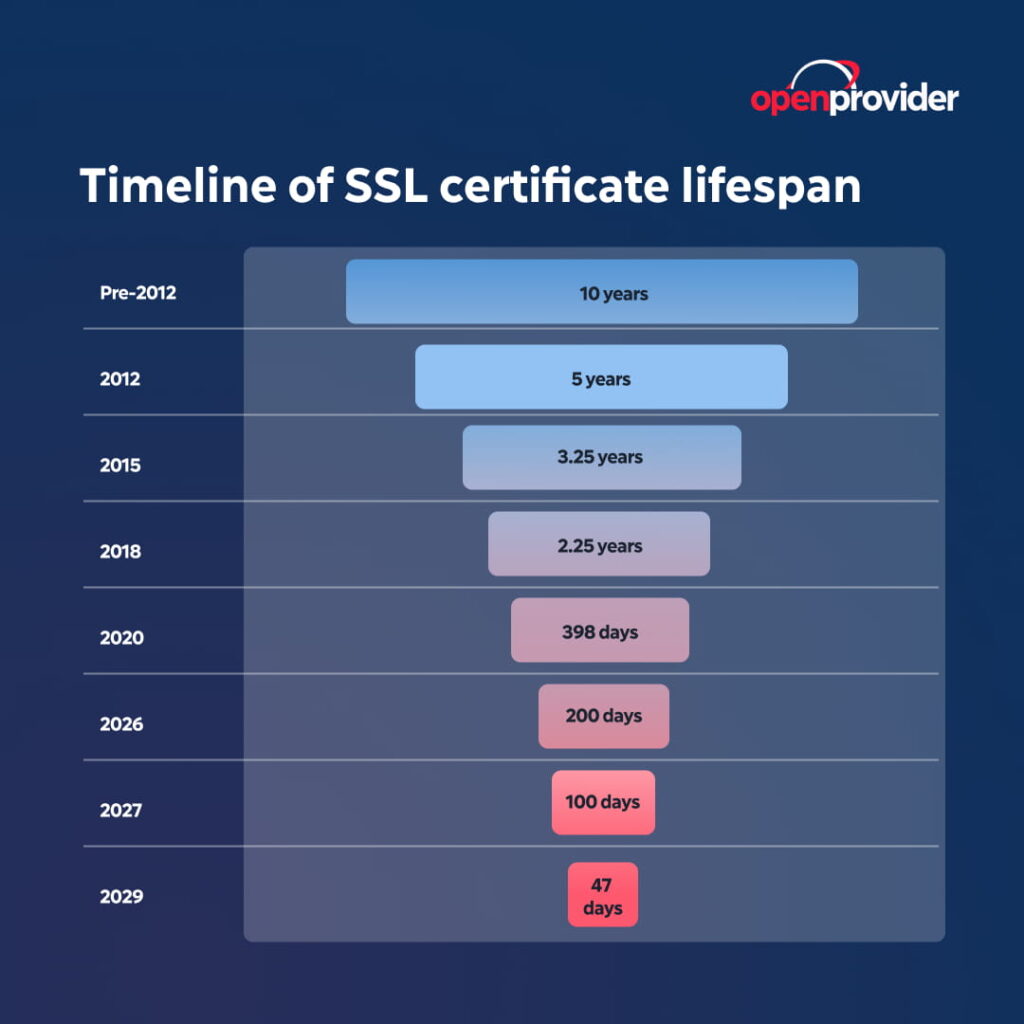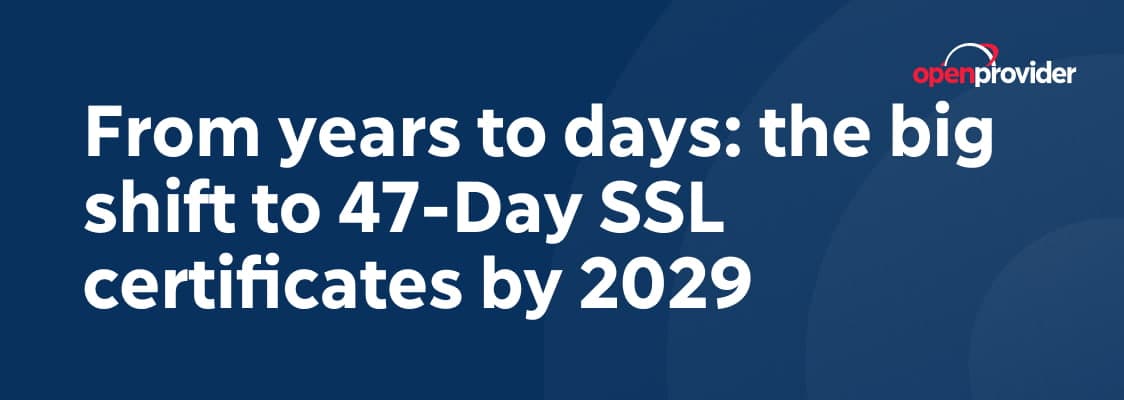What is the 47-day SSL change all about?
In a move that’s reshaping the entire internet security landscape, the CA/Browser Forum has proposed reducing the maximum lifespan of SSL/TLS certificates to just 47 days: a dramatic cut from the current 398-day standard.
This transition is expected to roll out fully by 2029, and it’s already causing ripples across the domain, hosting, and digital services industries, other than including a gradual reduction of the domain control validation (DCV), where the reuse period will require validation every 10 days.
For domain reselling businesses such as tech-savvy web hosters, IT providers, and digital agencies, this upcoming shift is a signal that automation, platform efficiency, and proactive certificate management will be more essential than ever.
The push of CA/Browser Forum
The C/A Browser Forum sees top player names among its members, including DigiCert, GlobalSign, as well as browser vendors such as Google, Apple, Mozilla, and Microsoft: in their effort to improve security through certification management, its members have approved the proposal of reducing SSL renewal time.
At the end of 2024, Apple submitted a ballot to shrink ssl/tls certificate lifespans from 398 days down to just 47 days by 2029, following up on Google’s initiative Moving Forward, Together. This proposal passed unanimously in April 2025.
C/A Browser Forum’s ballot sc‑081v3 marks a critical step in phasing down to 47‑day ssl periods.
Since 2012, the industry has consistently shortened SSL/TLS certificate validity periods to strengthen internet security and encourage automation.The upcoming transition to 47-day ssl certificates by 2029 is the latest (and boldest) step in this evolution.

Is it SSL or TLS?
Before diving deeper, let’s address one of the biggest question marks out there: are SSL the same as TLS?
The short answer is no. TLS (transport layer security) is the modern descendant of the original SSL (secure sockets layer) protocol. While “SSL certificate” remains common parlance, most certificates today use TLS under the hood, overhauling encryption standards, security features, and stability.
To dive deeper, check out our infographic on SSL vs TLS.
Why are SSL certificates being shortened to 47 days?
The reduction in certificate validity aims to:
- Improve security: Shorter lifespans limit the impact of compromised or mis-issued certificates.
- Support automation: Frequent renewals require robust API-driven integrations.
- Encourage industry best practices: It pushes resellers and providers to modernize their infrastructure and improve compliance.
What does the 47-day SSL change mean for your business?
If you’re managing a large portfolio of domains and SSL certificates, the switch to a 47-day SSL cycle presents several operational implications:
- More frequent renewals: no more annual set-and-forget workflows. SSL lifecycle management must become an automated task.
- Increased reliance on APIs: manual renewals will be unfeasible at scale. Automation via Openprovider’s SSL API becomes critical.
- Greater client expectations: end clients will expect uninterrupted, secure uptime. You’ll need reliable tools to meet that demand.
Whether you’re serving hundreds or thousands of clients, how you prepare now will define your efficiency and scalability in the years to come.
47-day SSL: what should you do next?
The shift to 47-day SSL certificates isn’t just a technical change: it’s an operational one. To stay secure, compliant, and efficient, businesses should begin preparing now. Here’s what to focus on:
- Review your certificate inventory
Take stock of all active SSL/TLS certificates, their expiration dates, and where they’re used (websites, applications, APIs, etc.).
- Evaluate your renewal processes
If you’re still handling renewals manually, assess how feasible that will be when renewals are needed every 47 days.
- Plan for automation
Shorter lifespans will require automated deployment and renewal: investigate how your infrastructure (platform, cms, hosting) supports certificate automation, and plan ahead on reaching a fully automated certificate lifecycle management (CLM).
- Monitor compliance timelines
Keep track of the phased rollout: 200 days in 2026, 100 in 2027, and 47 in 2029. Align internal policies accordingly.
- Coordinate across teams
SSL management often touches devops, security, and infrastructure teams. Ensure everyone understands the new requirements and timelines.
- Assess partner and vendor readiness
Check with your SSL certificate providers, resellers, or platform vendors to ensure they support shorter validity periods and automated workflows.
Not sure about how to add an SSL certificate to your website? Here’s how to get ahead with a step-by-step guide on SSL.
How openprovider supports your shift to 47‑day SSL
Navigating shorter certificate lifespans means switching from manual renewal routines to fully automated workflows.
At Openprovider, we’re here to make that transition seamless, especially for our premium SSL offering, built for scalability, reliability, and value.
- Automated renewals via premium SSL API
Our fully featured API supports automatic re-issues before expiration: set it once, and certificates renew without manual input.
- Premium SSL highlights
Our premium SSL certificate includes wildcard and multi-domain capabilities, extended validation options, up to 256‑bit encryption, and strong SEO trust indicators, all wrapped in a reseller‑friendly pricing model tied to our membership plans.
Via the dedicated dashboard, partners can track expiration timelines and renewal status in real time.
- Membership advantages
Access bulk and volume discounts, exclusive margin benefits, and flexible invoicing models that scale with your business.
- Ecosystem integrations
Seamless compatibility with WHMCS, Blesta, and other platforms ensures renewals are routed through your existing client interface, with no heavy lifting needed.
By choosing premium SSL with openprovider, you’re not just gaining a certificate: you’re getting a future‑proofed lifecycle system ready for the 47‑day era.
TL;DR – 47-Day SSL
- Industry leaders from the CA/Browser Forum have agreed to phase out long‑lived SSL/TLS certificates, dropping to 47‑day SSL cycles by march 15 2029.
- The transition will be gradual: 200 days → 100 days → 47 days, aligned with decreasing dcv reuse periods.
- This change demands automation, as manual renewals won’t cut it at scale.
- Shorter lifespans are not supposed to mean higher costs: you can still purchase 1‑ or multi‑year coverage and simply re‑issue certificates as validity periods shrink.
- With Openprovider’s Premium SSL offering, you get automated api renewals, DV, OV, and EV options, multi‑domain support, under a centralized point of control.
Takeaway
Audit your SSL renewal workflows, choose one of our premium SSL reselling plans, and leverage membership pricing to stay ahead of the market.
Have any questions? Our team is here to help you build agile, secure, and scalable certificate operations.


